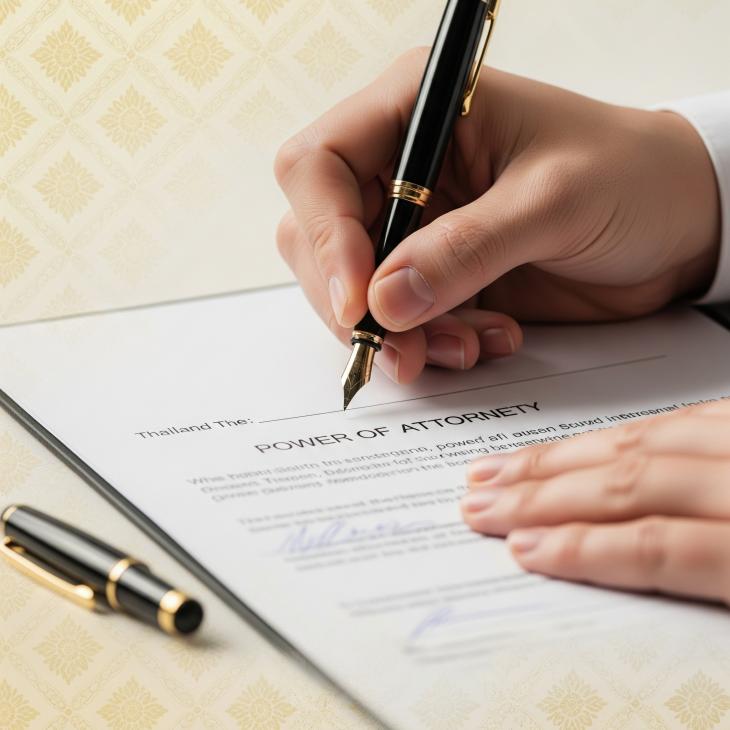Understanding Power of Attorney (POA) in Thailand for Foreign Nationals
A Power of Attorney (POA) is a legal document that allows you, the "principal," to grant authority to another person or entity, the "agent" or "attorney-in-fact," to act on your behalf in various matters. For foreign nationals dealing with legal or business affairs in Thailand, a POA can be an invaluable tool, especially when you cannot be physically present to handle these tasks yourself.
Understanding the different types of POAs and the notarization process is crucial for ensuring your interests are legally protected and your transactions are recognized under Thai law. It's important to note that while "Notary Publics" as understood in many Western countries don't exist in Thailand in the same form, licensed Thai lawyers, known as "Notarial Services Attorneys," are authorized to perform notarial acts, including the certification of signatures on a Power of Attorney.
Types of Power of Attorney in Thailand
There are generally two main categories of Power of Attorney that foreign nationals might encounter or require in Thailand:
- General Power of Attorney (มอบอำนาจทั่วไป - Mop Amnat Thuapai): This type of POA grants broad powers to your agent. The agent can perform a wide range of actions on your behalf, such as managing bank accounts, entering into contracts, or handling general business operations. Due to its extensive authority, a General POA should only be granted to a highly trusted individual.
- Special Power of Attorney (มอบอำนาจเฉพาะกิจ - Mop Amnat Chapaw Kit): This POA limits the agent's authority to specific, clearly defined acts or transactions. For example, you might issue a Special POA for selling a particular property, representing you in a specific legal case, or processing a particular business registration. For many official transactions in Thailand, such as those involving the Land Department for property matters, a specific format of Special POA provided by the relevant government office is often required.
It's also important to consider the concept of a Durable Power of Attorney. While not always a distinct "type" in Thai forms, the intent for a POA to remain valid even if the principal becomes incapacitated can sometimes be incorporated, though specific legal advice on this aspect is highly recommended.
How to Get a Power of Attorney Notarized in Thailand
The process of "notarizing" a Power of Attorney in Thailand typically involves the following steps, especially for foreign nationals:
- Drafting the POA: The Power of Attorney document must be drafted correctly. It should clearly state the names of the principal and the agent, the extent of the powers granted, any limitations, and the duration of the POA (if applicable). For specific transactions, particularly with government agencies like the Land Department, it is often mandatory to use their specific Thai-language POA forms (e.g., Tor Dor 21 for land, Or Chor 21 for condominiums).
- Language and Translation: If the POA is drafted in English (or another foreign language), an official Thai translation is usually required for it to be accepted by Thai government authorities. This translation should be accurate and often needs to be certified.
- Signing the POA: The principal must sign the POA. It is generally required for the signing to be witnessed.
- Notarization by a Notarial Services Attorney: A licensed Thai lawyer who is authorized as a Notarial Services Attorney can certify the signature of the principal on the Power of Attorney. They will verify the identity of the signatory and witness the signature. This is the closest equivalent to "notarization" in Thailand. For POAs signed by foreign nationals outside Thailand for use in Thailand, the document typically needs to be notarized by a Notary Public in that foreign country, then authenticated by the Thai Embassy or Consulate in that country before it can be used in Thailand. In some cases, further legalization by the Ministry of Foreign Affairs in Bangkok may be needed.
- POAs signed in Thailand by Foreigners: If a foreign national is in Thailand, they can sign the POA in the presence of a Thai Notarial Services Attorney. The Notarial Services Attorney will then attest to the authenticity of the signature.
- Specific Requirements for Government Agencies: Be aware that Thai government offices (e.g., Land Department, business registration offices) often have very specific requirements for POAs, including the use of their own forms, the number of witnesses, and necessary supporting documents (like certified copies of passports and visas). It's crucial to check these requirements beforehand.
- Duty Stamp: Powers of Attorney in Thailand are subject to stamp duty to be legally enforceable. The amount of stamp duty can vary depending on the nature of the POA.
Given the complexities, particularly for foreign nationals, it is highly advisable to seek assistance from a qualified law firm in Bangkok or elsewhere in Thailand. They can ensure the POA is correctly drafted, appropriately notarized or certified, and meets all Thai legal requirements for your specific situation, whether it's for property transactions, business matters, or other legal affairs.
FAQ Section
Q: Can a foreigner be an agent in a Power of Attorney in Thailand?
A: Yes, a foreigner can generally act as an agent (attorney-in-fact) in Thailand. However, for certain transactions, there might be specific requirements or practical considerations. Both the principal and the agent must have legal capacity.
Q: How long is a Power of Attorney valid for in Thailand?
A: The validity period can be specified in the POA document itself. If no period is specified, it generally remains valid until revoked by the principal, or upon the death or legal incapacitation of the principal or agent. However, some Thai government departments may prefer POAs to be relatively recent (e.g., within 3-6 months).
Q: Do I need to be in Thailand to make a Power of Attorney for use in Thailand?
A: No, you do not necessarily need to be in Thailand. You can execute a POA from abroad. However, it will need to be notarized by a Notary Public in your country of residence and then legalized/authenticated by the Royal Thai Embassy or Consulate in that country before it can be used in Thailand. It may then also require translation into Thai and sometimes further legalization by the Ministry of Foreign Affairs in Bangkok.
Q: What are common uses of a POA for foreigners in Thailand?
A: Common uses include buying or selling property (condominiums, land leases), managing bank accounts, incorporating a company, handling visa or immigration matters, and representing in litigation.
Q: What is the difference between a Notary Public and a Thai Notarial Services Attorney?
A: Thailand does not have a system of Notary Publics in the same way many Western countries do. Instead, certain licensed Thai lawyers can undergo specific training to become "Notarial Services Attorneys." They are authorized by the Lawyers Council of Thailand to witness signatures, certify documents, and administer oaths, performing functions similar to those of a Notary Public.
External Links Section
- Ministry of Foreign Affairs Thailand: For information on document legalization.
- Department of Lands (Thailand): For information related to property transactions and specific POA forms (content primarily in Thai).


